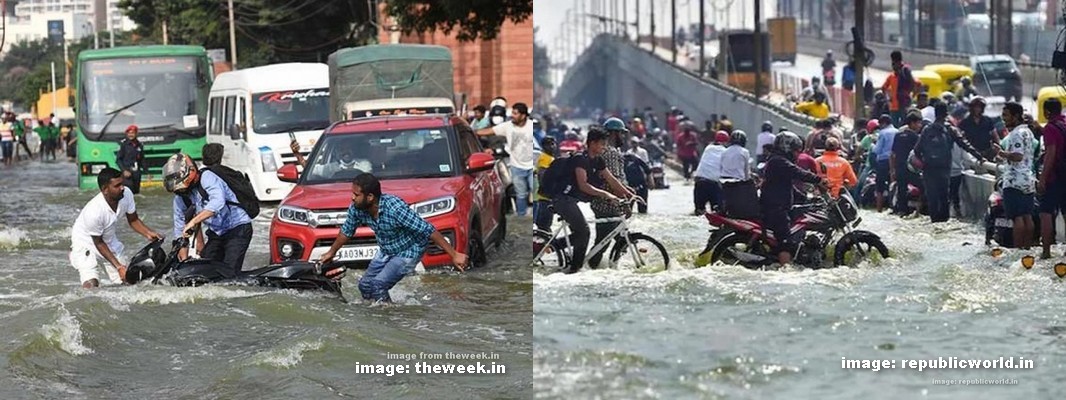Read time : 4 mins -|- Download this Blog
Change, they say, is the epitome of Constant. We hope for a good change and when it happens, change brings with it the good, bad and ugly. An undeniable fact! So here I am, ranting about my native city. Seeing it go through 4 decades of changes.
From being a garden city to garbage city, and from being a city of lakes to city of floods.
Let’s begin.
Content:
A brief history and the many names.
Bangalore, located in the Deccan plateau about 3000 feet above sea level. With distinct climates like summer, winter and monsoon, it is pleasant to moderate throughout the year. Thanks to 900mm of annual rainfall and 6 hours of average sunlight it receives in a day.
The cosmopolitan city has an estimated population of over 10 Million currently.
Trivia 1: Bangalore was renamed to Bengaluru in 2014.
Old habits die hard!
The city passed from the clutches of the kings of Vijayanagar empire, the Mughal Sultanate and later the British. They all played important roles in the development of the city.
The kings built many temples and lakes throughout the city for irrigation, farming and drinking. Bangalore is also known as City of Lakes, and believed to have had more than a 1000 lakes during the kings reign.
Also known as City of Gardens for its vast gardens and parks like Lal Bhag and Cubbon Park. During the 1950-60, the city served as an ideal place for retirees looking to spend their time in the calm weather and lush open parks. Hence the name Pensioners Paradise.
Due to the rapid growth of IT (Information Technology) and Science industries, the city earned the nickname “Silicon Valley of India” in the late 90s.
Boom and Doom.

The imminent strikes the city in the dawn of the 21t century.
The West got Bangalored!
Companies outsourced jobs to Bangalore, thereby attracting people from all over the country to take advantage of the growing job opportunity.
Rapid urbanization lead to encroachment of lakes so to make way for housing. And an uncontrolled property boom forces struggling farmers to part away with their farm lands for easy money.
Many gardens were converted to commercial spaces. Roads stand choked with traffic and pollution poses greater threat than ever. The city loses its glory at the cost of putting the country on the global economic map.
Engineers
Post independence, India poised itself for significant industrial development which created job opportunities. A fast growing job market for engineers leads to creation of Private and Government run technical institution across the country.
Hundreds of private colleges mushrooms the city as everybody wanted to become engineers. The South Indian states concentrate a majority of these private engineering colleges.
Nerdy and Geeky became the new cool!
Trivia 2: Many Indian Cricketers and Bollywood celebrities are engineers by education.

Some of the reason why there are so many engineers in India
- Engineering schools promise a fat pay cheque and placement opportunities hence parents force their children to pursue engineering.
- Societal pressure; parents see engineering as a very basic degree not only for employment but for matrimony and match making.
- Engineering is a status symbol for the middle class. A job at a multi-national company, a house, a car and an iphone is the definition of “well settled” according to Indian parents.
In India about 1.5 million students sign up every year for all disciplines of engineering, more than US and China combined. That’s too many engineers and few jobs. And only about 25% of engineers are employable because of their industry relevant skills and quality of education they receive from reputable institutions.
The rest of the engineers take up menial jobs for a living and to pay back their education loan. Sometimes parents repay loans with their retirement fund or pawning jewelry.
Some sell their land.
But Computer Science and Information Technology Engineers have very high placement rate and often end up in jobs. And thanks to engineers we have internet, smartphones and social media and they are getting more affordable than ever.
Trivia 3: Some Indian Engineers who turned famous authors.
Sudha Murty (chairperson Infosys Foundation), Chetan Bhagat,
Harsha Bhogle (Indian Cricket commentator)
Garbage
Hundreds of Technology companies have been setup in the last 2 decades. Most of these companies concentrated in a few pockets at strategic locations in the city. The Indian government came up with Special Economic Zone (SEZ), a scheme to promote exports and attract foreign investors by providing infrastructure with a liberal economical law and tax incentives. So foreign companies can setup their base in India with less legal hurdles.
Many lakes were encroached and many farm lands were converted to create space for the technology companies. The city saw an astronomical development that nobody imagined. The technology boom brought along with it the uncontrolled property boom and unplanned urbanization.
Sadly the development was only by means of poor planning. And mindless construction of industries,office space, hospitality and housing for the ever growing population in the city, which is currently estimated at 11 million.
The city generates about 4000 Tons of solid waste everyday and only 70% of that waste gets collected. And only 30-40% of waste gets processed or treated. While the rest ends up in landfills in remote villages, polluting soil and water in the vicinity thereby jeopardizing their livelihood.
A fast paced 9 to 5 life with both spouse working leaves no time for cooking, let alone time for social activities. Food is more likely ordered online and reaches ones door in less than 15 minutes! Thanks to the single use plastic that the food comes in and all those plastic from the online shopping, we have more garbage to dispose than ever.
Floods
Land in Bangalore sells like hot cake! And every inch of it is marked for sale. The landlords, land developers, industry lobby, and corrupt officials in their lust for making profits, play all the trick to sell a land. Even if that means to encroach a lake or drain.
Not only the lakes and drains are encroached, the construction debris are dumped in the drain. And most of the uncollected waste ends up in the drain. Thus leading to blockage and floods during monsoon that causes severe damage to properties.

The severity of 2020 floods in Bangalore is a wake-up call for the city authorities. It’s their duty to come up with a sound disaster management plan. And it also calls for responsible action from the residents in segregating waste and disposal.
What’s ironic? severe floods happened in the vicinity of the SEZ (Special Economic Zone) parks that houses the Tech companies. A result of poor planning that served a shocking gift to the law abiding, tax paying populace of engineers who put the city on the global map.
“We will make this a smart city” wow the politicians every time they seek votes during elections. And Bangalore has always tried to ape the infrastructure of developed global cities but has failed due to poor planning, corruption and lack of political will to deal with civic issues.
Parting thoughts
It’s already March and the monsoon will be back in a couple of months.
Helpless, all I can do is to hope the flood situation improves.
I am suggesting all the engineers to prepare themselves, for there
might be a “bring your boat to work” day! should hope fail.
In my 15 years of corporate career in the microprocessor industry, I have interviewed more than 200 people. And I could count the number of talented engineers who are passionate about their work, with the fingers on my right hand and still have fingers to spare.
They somehow graduated perhaps due to parental pressure. And it’s time that parents see their children take on professions they are passionate about rather than mindlessly choose to make them engineers.
Well floods in the city are an annual event,
but garbage and engineers? they are every where! All the time!
A vicious cycle of enormous jobs, countless companies, ever-growing population,
poor planning, mindless constructions, garbage, debris, flood and pollution
welcomes you to Bangalore Bengaluru!
[…] Engineers, Garbage and Floods. […]
[…] litter for our own sake. Not to forget the plight of those villages in the outskirts of cities like Bengaluru, that are used to dump […]